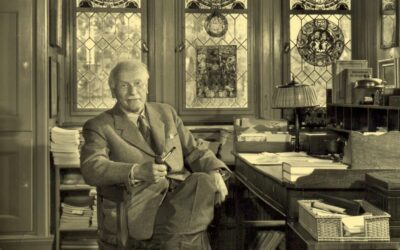Carl Gustav Jung (1875-1961) was a seminal figure in the history of psychology, whose original and wide-ranging thought laid the foundations for the field of analytical psychology. Over the course of his long career, Jung developed an extensive theoretical framework that encompassed such concepts as the collective unconscious, archetypes, psychological types, and the process of individuation. In this article, we will trace the development of Jung's ideas through the major periods of his life, exploring the...
The Psychology of Magenta: Emotional Integration, Wholeness, and Spiritual Transcendence
What does Magenta Mean in a Dream? Magenta, a captivating and enigmatic color, occupies a unique place in the spectrum of human perception and experience. Not found in the traditional sequence of visible light, magenta arises from the combination of red and violet wavelengths at opposite ends of the spectrum. As the last color humans evolved to perceive, magenta engages more recently developed and integrative brain networks, hinting at its profound capacity to promote emotional healing, self-acceptance, and...
The Psychology of Red: Passion, Power, and the Primal Self
What Does Red Mean in a Dream? Red, the color of blood and fire, is perhaps the most primal and visceral of all the hues on the spectrum. Associated with intense emotions, vital life force, and the very essence of human survival and power, red evokes a raw, instinctual response that cuts straight to the core of our being. In this comprehensive exploration, we will dive deep into the multifaceted nature of red, examining its profound impact on our physiology, psychology, and behavior. We will investigate the...
The Psychology of Orange-Red: Exploring the Paradox of Intensity and Transcendence
What does Red Orrange mean in a Dream? When the color red-orange appears in a dream, it often carries profound symbolic weight, representing a liminal space between the primal instincts of red and the expansive, illuminating qualities of orange. This hybrid hue suggests an interplay of forces: passion and transformation, desire and enlightenment, vitality and volatility. Red-orange frequently signals an urgent need for balance between action and reflection, between consuming intensity and the necessity for...
The Psychology of Orange: Igniting Passion, Creativity, and Transformation
What Does Orange Mean in a Dream Vibrant, energetic, and captivating, the color orange has long been associated with the fires of passion, the spark of creativity, and the alchemy of personal transformation. From the warm glow of a sunset to the bold brushstrokes of an abstract painting, orange hues seem to embody the very essence of vitality, enthusiasm, and the courage to embrace change. In this comprehensive exploration, we will delve into the multifaceted nature of orange, examining its profound effects on...
The Psychology of Yellow: Illuminating the Mind, Empowering the Self
What Does Yellow Mean in a Dream? Radiant and energizing, the color yellow has long been associated with the power of the mind, the clarity of thought, and the assertion of the self. From the golden hues of the sun to the vibrant shades of blooming flowers, yellow seems to embody the very essence of illumination, both in the physical and the metaphysical sense. In this comprehensive exploration, we will delve into the multifaceted nature of yellow, examining its profound effects on our cognitive functions, its...
The Psychology of Yellow-Green: Promoting Balance, Harmony, and Emotional Resilience
What Does Yellow-Green Mean in a Dream Yellow-green, the vibrant hue that bridges the lush tranquility of green and the radiant vitality of yellow, holds a unique place in the spectrum of human emotion and experience. This dynamic, dual-natured color seems to embody the very essence of balance, growth, and transformation. In this in-depth exploration, we will delve into the multifaceted nature of yellow-green, uncovering its profound effects on our neurophysiology, its rich symbolic and archetypal meanings, and...
The Psychology of Green: Nurturing Emotional Bonds, Healing, and Harmony
What Does Green Mean in a Dream? Green, the color of life, renewal, and balance, holds a special place in our collective psyche. From the lush foliage of forests to the emerald hues of a calm sea, green hues speak to something deep within us - a primal longing for connection, peace, and vitality. Green in dreams often symbolizes growth, renewal, and emotional balance. It is a color deeply tied to the natural world, representing harmony, fertility, and the cyclical nature of life. When green appears in dreams, it...
The Psychology of Blue-Green
What does Blue Green Mean in a Dream? Have you ever found yourself captivated by the soothing hues where blue meets green - in the shimmering scales of a fish, the iridescent feathers of a peacock, or the tranquil waters of a mountain lake? This mesmerizing color, occupying the liminal space between cool and warm, water and earth, sky and sea, seems to hold a key to unlocking profound states of emotional healing, balance and wholeness. In this deep dive article, we'll explore the multifaceted significance of...
Blue: The Color of Authentic Communication, Self-Expression and Inner Truth
The Psychology of Blue: Authentic Communication, Self-Expression and Inner Truth Blue, the color of the clear sky and deep ocean, has long been associated with calm, trust, and expansive awareness. From midnight indigo to tropical turquoise, blue hues invite us to explore realms of introspection, intuition, and profound self-expression. In this comprehensive article, we'll dive deep into the multi-layered meaning of blue - from the latest research on how blue light affects brain function, to the rich symbolism of...










